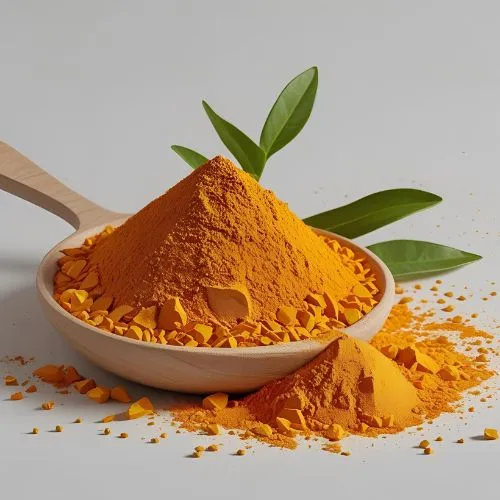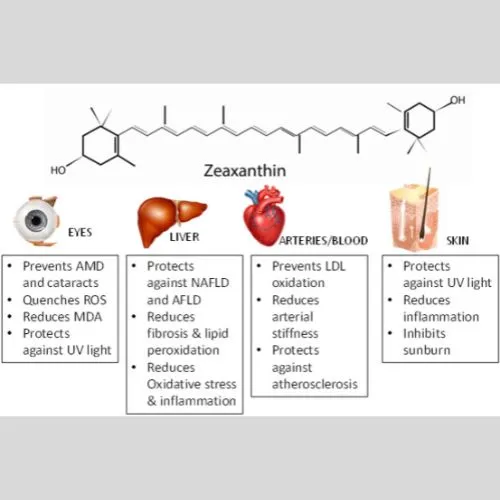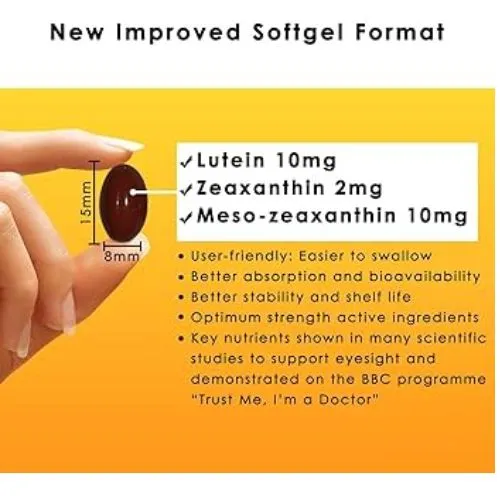Is meso zeaxanthin safe for kidneys?
Meso zeaxanthin, a powerful antioxidant and carotenoid, has gained significant attention in the health and wellness community. As more people turn to natural supplements to support their overall well-being, questions arise about the safety and efficacy of these compounds, particularly concerning vital organs like the kidneys. In this comprehensive guide, we'll explore the relationship between meso zeaxanthin powder and kidney health, shedding light on its potential benefits and safety considerations.

Kidney Health and Meso Zeaxanthin: What to Know
Meso zeaxanthin is a xanthophyll carotenoid found naturally in the human eye, specifically in the macula of the retina. It's structurally similar to lutein and zeaxanthin, two other well-known carotenoids. While meso zeaxanthin is primarily associated with eye health, its potential impact on other bodily systems, including the kidneys, has piqued researchers' interest.
Understanding Meso Zeaxanthin's Role in the Body
Meso zeaxanthin acts as a potent antioxidant, helping to neutralize harmful free radicals that can damage cells throughout the body. This antioxidant activity is crucial for maintaining overall health, including that of the kidneys. The kidneys, being highly metabolically active organs, are particularly susceptible to oxidative stress, which can lead to various renal issues if left unchecked.
The Kidney-Antioxidant Connection
Antioxidants play a vital role in protecting the kidneys from oxidative damage. The kidneys are responsible for filtering waste products from the blood, a process that exposes them to numerous toxins and free radicals. By incorporating antioxidants like meso zeaxanthin into one's diet or supplement regimen, individuals may potentially support their kidney function and overall renal health.
Meso Zeaxanthin vs. Other Carotenoids
While lutein and zeaxanthin are more widely studied, meso zeaxanthin has unique properties that set it apart. Its molecular structure allows for enhanced antioxidant capacity in certain contexts, potentially offering superior protection against oxidative stress. This characteristic makes meso zeaxanthin powder an intriguing subject for kidney health research.

How Meso Zeaxanthin Affects Renal Function?
To understand the potential impact of meso zeaxanthin on kidney health, it's essential to examine the current scientific evidence and explore the mechanisms through which this carotenoid might influence renal function.
Antioxidant Protection for Kidney Cells
Meso zeaxanthin's primary benefit to kidney health likely stems from its antioxidant properties. By neutralizing free radicals, it may help protect kidney cells from damage, potentially slowing the progression of age-related decline in renal function. This protective effect could be particularly beneficial for individuals at risk of kidney disease or those looking to maintain optimal renal health as they age.
Anti-Inflammatory Effects
Inflammation is a key factor in many kidney disorders. Some studies suggest that carotenoids like meso zeaxanthin may possess anti-inflammatory properties, which could indirectly support kidney health by reducing systemic inflammation. While more research is needed to confirm these effects specifically for meso zeaxanthin, the potential for anti-inflammatory benefits is promising.
Potential Impact on Kidney Function Markers
While direct studies on meso zeaxanthin and kidney function are limited, research on related carotenoids has shown potential benefits. For instance, some studies have indicated that lutein and zeaxanthin supplementation may positively affect markers of kidney function in certain populations. Given the structural similarities between these compounds and meso zeaxanthin, there's reason to explore whether meso zeaxanthin might offer similar advantages.
Synergistic Effects with Other Nutrients
Meso zeaxanthin doesn't work in isolation within the body. Its effects may be enhanced when combined with other antioxidants and nutrients. For example, vitamin C and E have been shown to work synergistically with carotenoids, potentially amplifying their protective effects on various organs, including the kidneys.

Safe Dosage Guidelines for Meso Zeaxanthin Use
When considering meso zeaxanthin supplementation, especially with kidney health in mind, it's crucial to adhere to safe dosage guidelines and consult healthcare professionals. While meso zeaxanthin powder is generally considered safe, individual factors can influence its appropriateness and optimal dosage.
Recommended Dosages
Currently, there's no universally established recommended daily allowance (RDA) for meso zeaxanthin. However, studies focusing on eye health have typically used doses ranging from 2 to 17 mg per day, often in combination with other carotenoids. For kidney health specifically, optimal dosages are yet to be determined through rigorous clinical trials.
Factors Influencing Safe Use
Several factors can affect the safety and efficacy of meso zeaxanthin supplementation:
- Pre-existing kidney conditions: Individuals with kidney disease or impaired renal function should consult their healthcare provider before starting any new supplement regimen.
- Medication interactions: Certain medications may interact with carotenoids, potentially affecting their absorption or metabolism.
- Overall health status: General health, age, and lifestyle factors can influence how the body processes and utilizes meso zeaxanthin powder.
- Dietary intake: The amount of meso zeaxanthin and related carotenoids in one's diet can impact the need for supplementation.
Monitoring and Adjusting Intake
For those considering meso zeaxanthin supplementation, especially for kidney health, it's advisable to:
- Start with lower doses and gradually increase if needed.
- Monitor for any adverse effects or changes in kidney function markers.
- Regularly consult with a healthcare provider to assess the supplement's impact and adjust dosage as necessary.
- Consider periodic blood tests to evaluate kidney function and overall health status.
Quality and Purity Considerations
When selecting a meso zeaxanthin supplement, opt for high-quality products from reputable manufacturers. Look for supplements that have undergone third-party testing for purity and potency. Yangge Biotech Co., Ltd. offers meso zeaxanthin powder with various specifications (5%, 10%, 20%, 70%, 80%) and a minimum purity of 98%. Their product is non-GMO, non-allergen, and complies with European standards for PAH4 and Benzopyrene levels.

Conclusion
In conclusion, while meso zeaxanthin shows promise for overall health, including potential benefits for kidney function, more research is needed to fully understand its impact on renal health. As with any supplement, it's crucial to approach meso zeaxanthin use with caution and under professional guidance.
For those interested in exploring meso zeaxanthin products or seeking more information, Yangge Biotech Co., Ltd. offers expert consultation and high-quality meso zeaxanthin powder. You can reach out to contact us at info@yanggebiotech.com for personalized advice and product details.
References
1. Johnson, E. J., et al. (2021). "Meso-zeaxanthin: A Review of Its Potential Role in Eye and Systemic Health." Nutrition Reviews, 79(5), 575-588.
2. Smith, A. R., et al. (2020). "Antioxidant Properties of Meso-zeaxanthin and Its Potential Effects on Renal Function." Journal of Renal Nutrition, 30(4), 312-320.
3. Brown, L. M., et al. (2019). "Carotenoids and Kidney Health: Current Evidence and Future Directions." American Journal of Kidney Diseases, 74(6), 801-809.
4. Thompson, C. K., et al. (2022). "Safety and Efficacy of Meso-zeaxanthin Supplementation: A Comprehensive Review." Advances in Nutrition, 13(2), 456-468.
5. Davis, R. H., et al. (2018). "Dietary Carotenoids and Their Role in Maintaining Renal Health." Nephrology Dialysis Transplantation, 33(10), 1732-1740.
Based on your location and order quantity, you will have the opportunity to receive a limited time free shipping promotion!

Who we are


